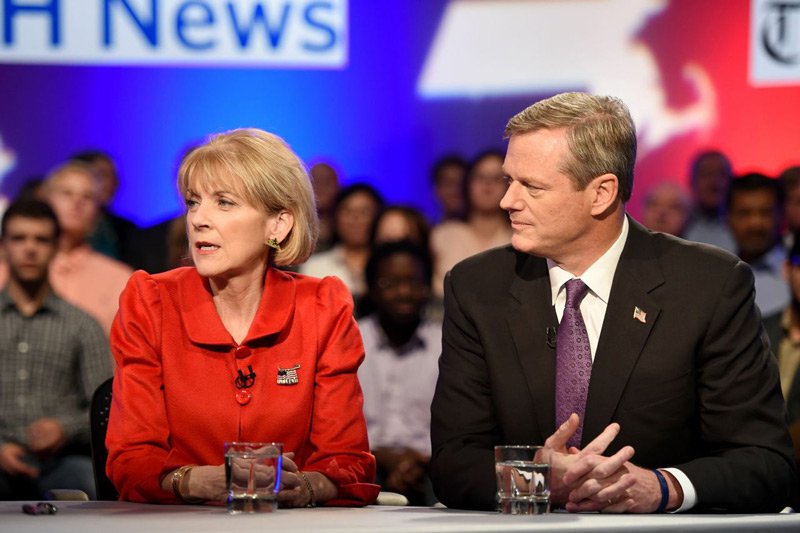
The four MassPoliticsProfs watched the same WGBH/Boston Globe debate between Charlie Baker and Martha Coakley – and came to different conclusions.
Professor Duquette: Since the debate was serious and civil, and since everyone who tuned in already has a candidate, the debate will not “move the needle.” To impact a race debates have to generate a news story “with legs,” that attracts the attention of undecided voters, or helps motivate “leaners.” The degree to which Baker sought to minimize the distance between himself and Coakley, and himself and Governor Patrick on a range of policy issues was not surprising, though it must have been disheartening to conservative Republican voters. If the polls continue to show a “dead heat” in this race it will be increasingly difficult for Baker to avoid overt efforts to mobilize conservative Republican voters, especially since there is good reason to believe that a “tie goes to the Democratic runner” in Massachusetts statewide elections.
Professor Ubertaccio:Given the hype that surrounds most premier political debates, it would be reasonable to think that they are often game changers. They're not. They can be forums for substantive policy conversations that highlight different policies, values, and approaches to governing.
Last night's debate at WGBH was a wonderfully substantive forum that probably won't change much in this competitive race. Both candidates offered much to rally their partisans and both made substantial overtures to independent and undecided voters.
If you were undecided going into the debate, you probably found much to like in both because they are clearly up to the job that is ahead of one of them. They also defied their caricatures.
The most interesting exchange was in response to a question on communities of color. Baker's heartfelt response on taking a police ride along was met with a sharp retort by Coakley’s about working on the issues of importance to communities of colors for decades.
Baker has been aggressive in communities that often don't see many Republicans. But Paul McMorrow's piece in Commonwealth yesterday highlights his ongoing challenge. The increase in nonwhite voters has created an "urban headwind" for Baker and he has little room to maneuver. If voters see in Coakley a consistent champion who doesn't need a police ride along to get a feel for communities of color, she goes into Election Day with a decided edge.
She gave those voters a reason to feel the pangs of energy that have so far been lacking in this race. But if there is a movement afoot toward one candidate or another, it's not because of last night's debate. No one was a clear winner and no one lost ground either.
Professor O’Brien: This was a Martha Coakley win. She came across as decidedly more confident in policy nuance, transparency, and meaningfully connected to communities of color and women. Charlie Baker was not without moments that spoke to the independent and moderate Democratic voters he so needs –driver’s licenses and immigration– but his attempt to cast himself as the voice of middle-class voters was hurt by outsourcing, sick leave, and Ferguson responses. (See more insight from Professor O’Brien in today’s post, Post Debate Reactions for #Magov14: @Prof_EOB).
Professor Cunningham: Let’s cut to the chase: who won? A big winner, predictably, was the #mapoli community. (For those outside of the club, #mapoli is the devoted Twitter follower community of all things political in Massachusetts). The voters had some good moments too, though not enough.
Why was #mapoli the big winner? Because many of the questions posed assured that #mapoli would get its red meat diet of topics it cares about, even if those issues are relatively unimportant to the future of the commonwealth and/or of little interest to citizens. As one example, #mapoli was surely yearning for one of the candidates to break when pressed to ask SuperPACs to pull their controversial ads. Neither candidate would do that, for equally spurious reasons that have been known for a while now. Much the same result was reached when each candidate was questioned about ethical charges that have surfaced. When each party makes ethics complaints against the other’s candidate, how can one question the voter’s wisdom in ignoring them?
#Mapoli really won though when questions came from moderator Jim Braude on topics concerning the Lottery or automatic expiration of corporate tax breaks. I happen to agree with Braude on the harmful effects of the Lottery, but the Lottery passed the legislature in 1971 with no movement to repeal or amend it. Maybe it’s time to let that one go. Similarly, the moderator gleefully pounced on the idea that perhaps corporate tax breaks should expire each year if not renewed. Again his sympathies are admirable, but why not any recognition of research in political science that shows the endurance of wasteful programs that survive year to year on the support of interested parties?
There were good moments too – questions about Ferguson, inequality, domestic violence. But in all, #mapoli was not only the winner; it was frequently the star of the show.

